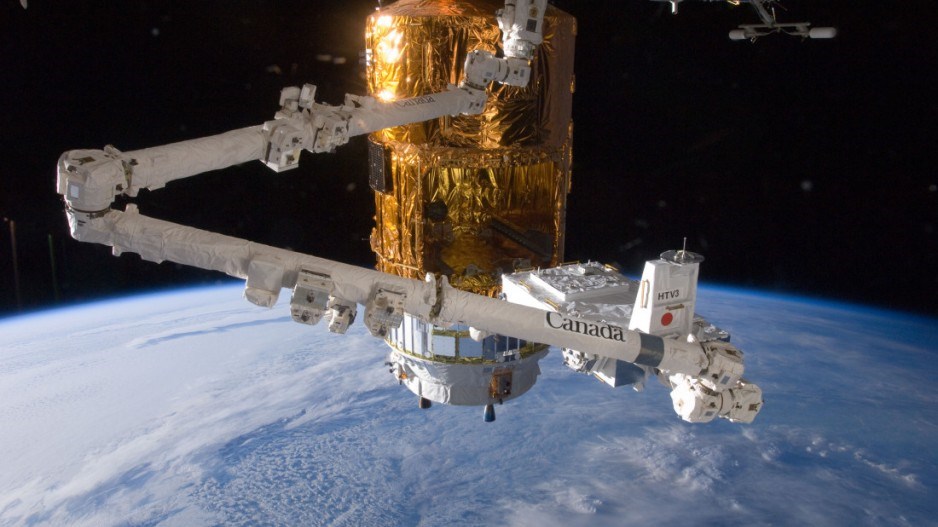Sending its technology to far-off destinations has been the raison d’être of MDA since its inception in 1969.
Its iconic Canadarm2 sits on the International Space Station and its Radarsat-2 satellites orbit the Earth, collecting surveillance data for the government.
Now the Vancouver-based aerospace firm originally known as MacDonald, Dettwiler and Associates Ltd. is being pulled deeper into the orbit of the U.S. as it attempts to gain access to lucrative American government contracts.
In October 2017 MDA completed its US$2.4 billion acquisition of Colorado-based DigitalGlobe Inc.
The deal sets MDA on a path to be fully incorporated in the U.S. by 2019; American CEO Howard Lance has been based in the U.S. since he replaced Daniel Friedmann in 2016.
Lance is leading MDA’s newly created parent company, Maxar Technologies Ltd. (TSX:MAXR), as its CEO while Mike Greenley takes over as group president of MDA on January 15. Greenley will be based out of MDA’s office in Brampton, Ontario.
“It’s not expected to adversely affect what we do in Canada. In fact, quite the opposite,” said Norman Hannaford, MDA’s vice-president and general manager responsible for its surveillance and intelligence business.
Maxar is divided into four business units: MDA, DigitalGlobe, SSL (an American satellite communications and Earth observations company MDA acquired in 2012) and Radiant Solutions (a geospatial data and analytics company DigitalGlobe acquired in 2016).
“We’ve got those four elements now as part of the broader portfolio, each of which are going to operate as their own distinct brand,” Hannaford said.
“It gives us much greater strength to understand, anticipate and address those complex, mission-critical challenges that our customers have, not just in the U.S. government but internationally as well.”
This is not the first time MDA has pushed toward becoming an American enterprise.
In 2008 Ottawa blocked the US$1.3 billion acquisition of MDA’s space division by Virginia’s Alliant Techsystems Inc. after the deal failed Industry Canada’s net-benefit test.
The test looks at such factors as whether there will be a Canadian headquarters or job cuts.
Marc Garneau, former head of the Canadian Space Agency, also voiced concerns at the time that the sale would result in handing over taxpayer-funded technology to a foreign company.
But by January 2017, MDA and its U.S.-based subsidiary, known as Maxar Holdings, entered into a security control agreement with the U.S. Department of Defense. The agreement allowed MDA to pursue classified U.S. government programs as it sought to become incorporated in the U.S.
“MDA/SSL has now received security clearances to pursue U.S. government business and seems to be gaining momentum with deals with NASA and DARPA [Defense Advanced Research Projects Agency],” Steve Arthur, a director at RBC Capital Markets, wrote in a research note to investors after the deal was announced in October.
“We understand the pipeline of activity is robust, and should be accelerated with the contacts, scale and infrastructure of the DigitalGlobe business.”
William Braithwaite, a lawyer specializing in mergers and acquisitions (M&A) who worked on the MDA deal, said it would have been unusual in the past for Canadian companies to make big acquisitions of American companies, but that trend is changing.
“Canadian companies are looking south of the border for opportunities, and MDA is not unique in that area,” he said. “MDA just saw that they needed to go south to expand their business. They were hitting ceilings in Canada – although they continue to grow the business in Canada, they saw lots of opportunities in the U.S. And in order to do that they needed to make acquisitions, and they had to comply with the regulatory challenges that that presents.”
During 2017’s third quarter, the number of Canadian companies making acquisitions abroad outnumbered foreign companies making domestic acquisitions by a factor of 1.7, according to a November Crosbie & Co. Inc. M&A report.
“This is a trend that has been observed since 2011 and has held true regardless of exchange rate fluctuations,” the report noted.
South of the border, Canadian companies made 123 acquisitions valued at $35 billion during the third quarter compared with the 58 deals valued at $2.3 billion made by the Americans.
Meanwhile, Hannaford said MDA is still focused on the Canadian market, specifically efforts to provide communications technology for the navy’s next generation of ships as part of the Canadian Surface Combatant (CSC) program.
MDA announced in November it was joining a consortium that included Lockheed Martin Canada in a bid to build 15 new ships to replace the Royal Canadian Navy’s Halifax-class frigates and Iroquois-class destroyers.
MDA would provide electronics, antennas, radar, software and system engineering for the new naval ships.
Dave Hargreaves, MDA’s vice-president of aerospace and defence, surveillance and intelligence, told Business in Vancouver MDA facilities in B.C., Ontario and Quebec would all be involved in developing the products and systems used on the new ships.
“One of the key aspects of the procurement is creating economic benefits to Canada,” Hargreaves said. “We have worked together with Lockheed Martin and the other partners to do a lot of really creative stuff about building the ships in Canada.”
The government pegs the cost of the CSC program at between $56 billion and $60 billion.
And while Hargreaves could not provide an exact number of MDA employees who’d be involved with the program, he said, “The answer is ‘a lot.’”
@reporton



